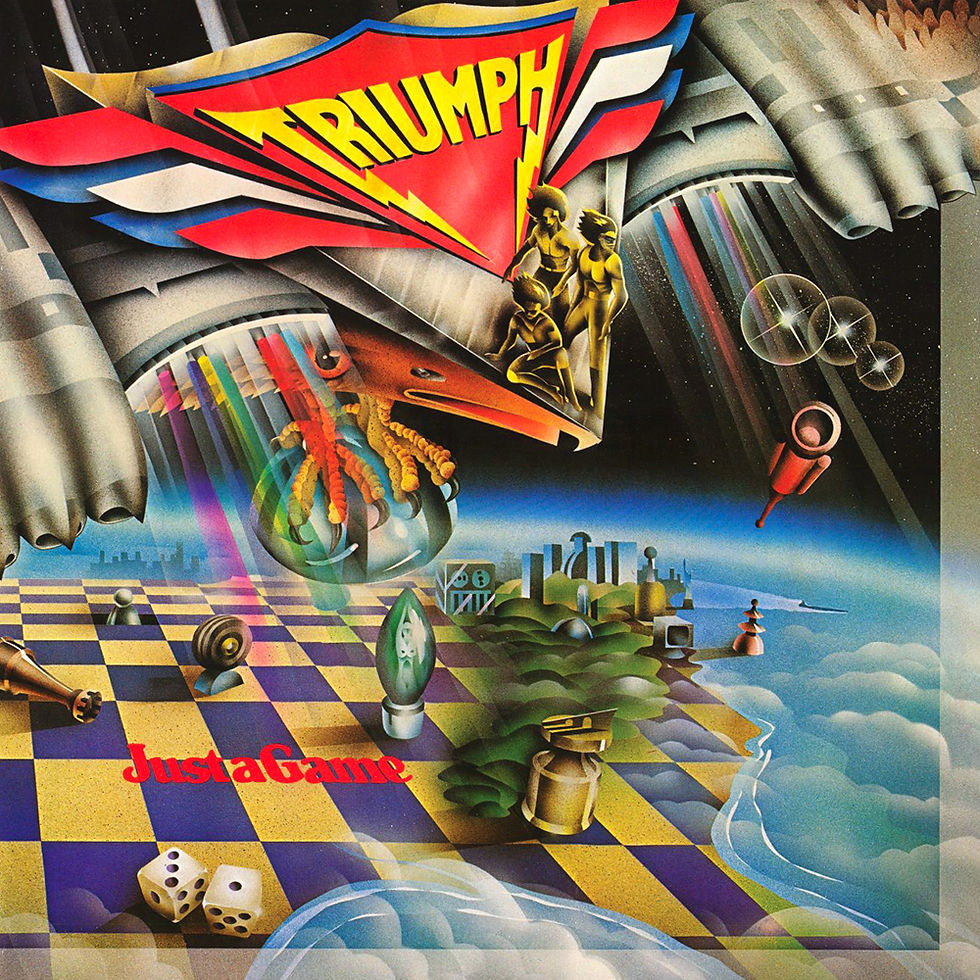Triumph - Triumph
- FaceOff - עימות חזיתי

- Oct 13, 2025
- 3 min read
On October 13, 1976 "Triumph" released it self-titled debut album (later titled "In the Beginning" on its 1995 reissue).

This album marked the first step in the career of one of Canada's most iconic rock power trios. Formed in 1975 in Toronto, "Triumph" initially started as a four-piece blues-based band called "Abernathy Shagnaster", featuring Fred Keeler on guitar, Peter Young on organ, Mike Levine on bass, and Gil Moore on drums and vocals. The band released their debut single in 1975, but Keeler and Young left the band shortly after. During the summer of 1975 Moore and Levine met Rik Emmett, a guitarist from the band "ACT III", and after a jam session at Moore's house, Emmett joined the band. Emmett's progressive rock and classical music influences brought a new dimension to the band's sound.
Released exclusively in Canada on Attic Records, "Triumph" remained relatively obscure until it was later rebranded and rereleased in 1995 as "In the Beginning" for international audiences. The album is a reflection of a young band still finding its voice, but it already showcases the signature blend of Blues, Hard Rock, Classical and Progressive that would come to define "Triumph’s" sound.
The album kicks off with “24 Hours a Day,” which starts as a quiet "Boston"-like ballad and slowly develop to a driving hard rock track that sets the tone with its energetic riffs and infectious chorus. This opener captures "Triumph’s" early party-rock spirit, giving listeners a taste of the power and excitement the band brought to the table. Already in this song we are witnessing this band added value with two excellent lead vocalist, with Rik Emmett takes the lead in the quiet intro, while Gil Moore doubled as lead singer on the heavier part.
Following it is "Be My Lover," a bluesy, riff-driven track that leans into the band's rock roots with a Talk Box solo by Emmet. The guitar sound and the sudden breaks will surly reminds you of "Rush" early years. "Don’t Take My Life" is another standout with its aggressive energy, with a chord progression reminiscent of the climax part in "Led Zeppelin's "Stairway to Heaven", while "Street Fighter" presents a two-part suite. The first part is fast-paced, almost proto-speed metal, and the second part takes on a more ethereal and dreamy quality, showing "Triumph’s" ability to balance both hard rock and more complex arrangements within one song.

"What's Another Day of Rock 'n' Roll" will remind you of "Bachman–Turner Overdrive" and "Let Me Get Next to You" reveal the band's versatility with a hard rock intensity. "Easy Life," on the other hand, offers a more laid-back vibe, showcasing the band's softer side.
The album’s centerpiece, however, is “Blinding Light Show / Moonchild,” a nearly nine-minute progressive epic that blends Rik Emmett’s virtuosic guitar work with atmospheric keyboard layers and expansive song structures. This track is where "Triumph’s" progressive rock ambitions are most fully realized, showcasing Emmet's strong classical and Spanish roots, hinting at the experimentation they would continue in future releases.
Initially the album was released solely in "Triumph's" homeland Canada. It was only after the band's second album, "Rock & Roll Machine" that "Triumph" signed an international deal with RCA in the States. The label combined four songs each from the two Canadian albums into the "Rock & Roll Machine" (US) that was more available to fans around the world.
While overshadowed by later albums "Triumph’s" debut plays a crucial role in the band’s early development. It captures the early spirit of a trio on the verge of breaking out and provides a glimpse into the elements that would make them one of the defining hard rock bands of the late ’70s and early ’80s.
For Listening: Spotify, Apple Music













Comments